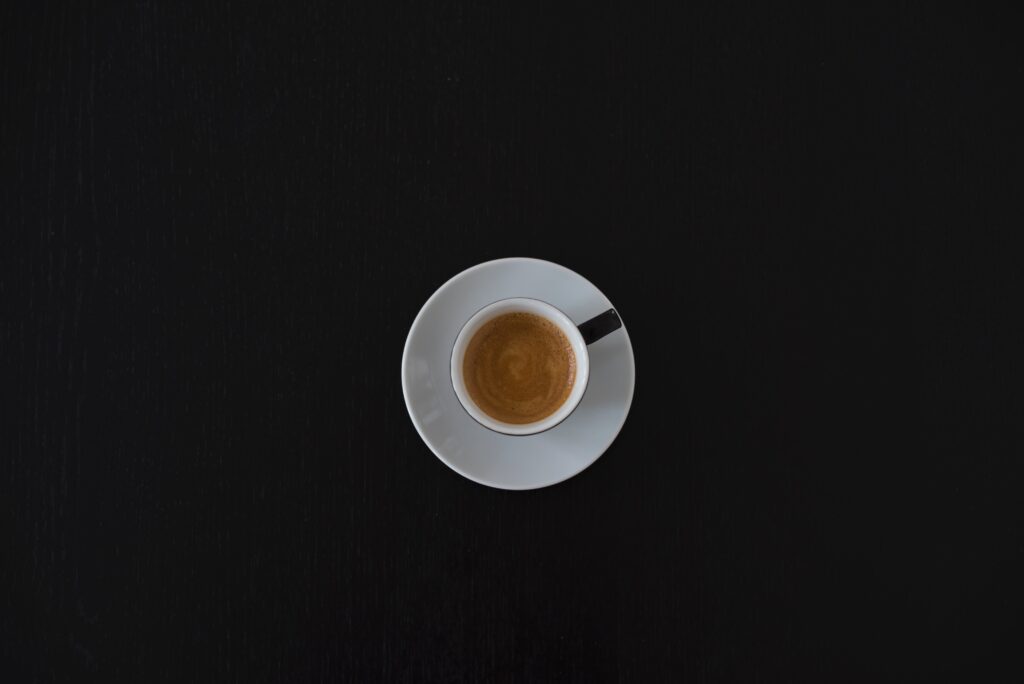
We consume it at breakfast, on the way to work, at the end of a meal, as a snack, or on the terrace… coffee is undoubtedly one of the world’s most popular beverages! While some people consume one or two cups of coffee a day, others may drink more than seven cups a day. While caffeine is indeed a molecule with many virtues, it’s important to remember the risks of drinking too much coffee.
So let’s take a look at the risks of drinking too much coffee, particularly the risks associated with caffeine. Is it dangerous to drink too much coffee, and what is the recommended amount? Let’s find out now!
What is coffee?
Coffee is an energizing, stimulating beverage produced from the roasted seeds of the coffee plant (Coffea). Roasting is an essential stage in coffee production as it is during this process that the beloved flavors and aromas of coffee are developed. It involves exposing the green coffee beans, which have a low aroma, to a source of heat. The roasting process must be carefully controlled since poorly roasted or over-roasted coffee beans will result in an undrinkable beverage. Along with tea and mate, coffee is one of the most widely consumed beverages in the world, and all three contain caffeine.
Historically, the first coffee to be discovered and cultivated came from Ethiopia in the form of Arabica. Arabica is now considered the best variety for enjoyment, as it produces a beverage with a sweeter, finer aroma compared to other varieties such as Robusta. Arabica also has a lower caffeine content. However, Robusta is more prevalent and consumed due to its lower cost. Arabica is primarily grown in the mountains of Central and South America and East Africa, while Robusta is produced in West Africa and Southeast Asia.
What are the risks of drinking too much coffee?
Drinking excessive amounts of coffee can cause restlessness
Due to the stimulating and energizing effects of caffeine, drinking coffee can make us feel restless. It is not uncommon for individuals to choose this beverage to counteract fatigue in the morning or after lunch in order to regain energy. Conversely, many people avoid drinking coffee in the evening as it can cause restlessness and hinder sleep.
Drinking too much coffee can disrupt sleep
Excessive coffee consumption does indeed have a negative impact on sleep. Caffeine, being a stimulant, keeps certain receptors in the brain active, thus affecting sleep. Difficulties in falling asleep, restless sleep or reduced sleep time are possible consequences.
Addiction
Addiction refers to the phenomenon wherein the body becomes accustomed to an external substance or stimulus. Caffeine consumption is no exception, as our bodies gradually become accustomed to the stimulating effects of this molecule through regular consumption.
It often starts with two or three cups of coffee a day, but over time, the effects diminish. As a result, individuals may increase their consumption to four cups, which becomes less and less stimulating, leading to the need for a fifth cup, and so on. This cycle can lead to excessive coffee consumption.
During pregnancy
Pregnancy brings about several physiological changes in a woman’s body, including alterations in caffeine metabolism. In fact, the time caffeine remains in the body of a pregnant woman is twice as long as that of an adult. It is advisable for pregnant women to limit their coffee intake to one cup per day. Additionally, consuming excessive amounts of coffee during pregnancy, and the consequent excess caffeine, can increase the risk of premature delivery.
Does drinking too much coffee lead to weight gain?
Coffee itself is a low-calorie beverage and does not contribute to weight gain, as it contains no significant calories. However, coffee-based beverages often contain added ingredients such as sugar, syrup, milk, or cream. Some coffee shop beverages, even in their small sizes, can contain up to 700 calories!
Therefore, it is not coffee itself that can lead to weight gain, but rather the choice of coffee-based drinks, their frequency of consumption, and their integration into the overall daily diet.
How much coffee should you drink per day?
According to the European Food Safety Authority (EFSA), the daily limit for caffeine consumption is 400 mg, which is approximately equivalent to three cups of coffee per day. The EFSA states that caffeine consumption below 400 mg is considered safe for most individuals, with the exception of pregnant and breastfeeding women, for whom coffee consumption is not recommended.
How can you determine if you're drinking too much coffee?
Based on the EFSA’s recommendation of a maximum of 400 mg of caffeine per day, exceeding three cups of coffee per day can be considered excessive.
Certain signs may also indicate excessive coffee consumption: frequent urination, feelings of dehydration, insomnia, muscle fatigue, irritability, or digestive discomfort are common indicators.
It’s important to note that sensitivity to caffeine varies from person to person. Some individuals may experience the mentioned signs even after consuming just one cup of coffee.
Does drinking too much coffee cause dehydration?
We have already mentioned the stimulating effect of coffee due to its caffeine content. It is often suggested that excessive coffee consumption can lead to internal dehydration as it increases water losses from the body. However, this phenomenon has only been demonstrated in cases of consuming six cups of coffee per day or more.
If you consume a significant amount of coffee, it is advisable to ensure adequate hydration by drinking water or herbal teas alongside it. Moderate consumption, within the recommended range of one to three cups per day, poses no risk of dehydration caused by coffee.
Limiting coffee consumption
The initial step in reducing coffee consumption is to gradually decrease the number of cups consumed per day. For instance, if you currently drink 10 cups of coffee daily, start by cutting back to 8 or 9 cups instead of abruptly reducing to three cups.
It’s also worth exploring various alternatives to coffee and caffeine.
Coffee alternatives
One frequently suggested alternative to coffee is chicory, which contains less caffeine. Another option is Caro, which provides a similar aroma and smell to coffee but without the caffeine content.
Many people consider replacing coffee with tea. However, it’s important to note that tea also contains caffeine, albeit in smaller amounts. Although tea is often referred to as having theine, it is the same molecule and therefore has similar stimulating effects. Nevertheless, tea, especially green, white, or oolong varieties, contains less caffeine compared to coffee. In fact, while a 20-cL cup of green tea provides 37 mg of theine, a 4-cL double espresso contains 80 mg of caffeine. Tea can be an excellent alternative if you consume excessive amounts of coffee. The Ifop study mentioned earlier shows that 57% of French people have replaced at least one cup of coffee with tea during the day.
In general, drinking coffee is not dangerous for your health, but excessive consumption over time can have negative consequences. Enjoy your cup of coffee leisurely and without guilt, as long as you stay within the recommended limits. Caffeine, when consumed in moderation, poses no harm.


